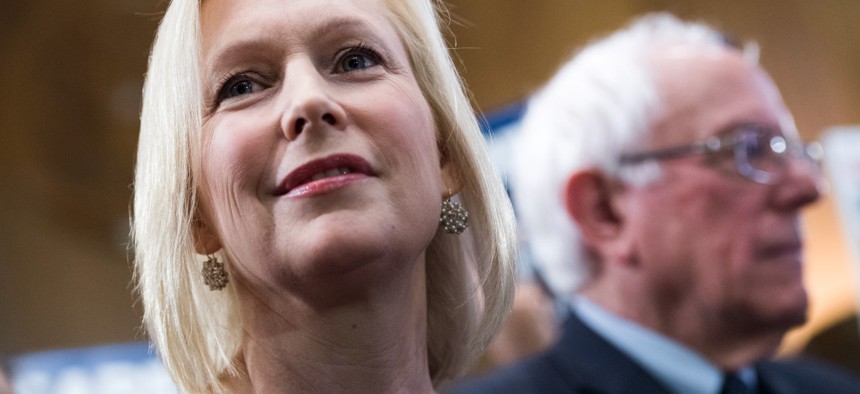
Sens. Kirsten Gillibrand, D-N.Y., and Bernie Sanders, I-Vt., are two of the sponsors of the new postal banking bill. Tom Williams/CQ Roll Call via Getty Images
Postal Banking Isn’t Done Yet, Even Though It Was Stripped from the Recent Spending Package
Democrats have introduced a new postal banking bill and advocates are still hopeful USPS will expand a small pilot program it launched last year.
Senate Democrats are renewing their call for more banking services at the U.S. Postal Service, looking to push the mailing agency further after it began a pilot program last year.
Sens. Kirsten Gillibrand, D-N.Y., Bernie Sanders, I-Vt., and Jeff Merkley, D-Ore., introduced a postal banking bill (S. 3891) on Tuesday after congressional negotiators kicked language demanding additional financial services at USPS off the fiscal 2022 omnibus funding package President Biden signed into law last week. The new measure would allow the Postal Service to offer low-cost checking and savings accounts, ATMs, mobile banking and low-interest loans.
House Democrats had included in their original fiscal 2022 funding bill $6 million for USPS to pilot “non-banking financial services” in at least five rural and five non-rural ZIP codes, including surcharge-free ATMs, wire transfers, check cashing and bill payment “to the fullest extent permitted under current statutory authority.” The Postal Service is already involved in financial services by offering money orders, the lawmakers noted.
Ultimately, after negotiations with the Senate, where bipartisan support was required to clear a 60-vote threshold, the language was removed from the measure. Gillibrand and Sanders, along with various House members, such as Rep. Alexandria Ocasio-Cortez, D-N.Y., had also pushed for inclusion of the provision in the funding bill.
“What we are asking the Post Office to do here is very basic but it’ll make a dramatic difference in so many communities and so many families,” Ocasio-Cortez said last year. “It’ll also provide needed revenue to USPS.”
Progressive lawmakers have for years pushed USPS to offer more banking services, but postal management has largely demurred. Instead, the agency has said it should shore up its finances by focusing on its core offerings. Last year, however, Postmaster General Louis DeJoy worked with the American Postal Workers Union to launch a small-scale pilot authorizing a few post offices to offer limited check cashing services. In the first four months of that program, however, the post offices provided cashed checks—in the form of Visa gift cards—for just six customers, which brought in $35.70 to USPS.
Postal management has said it will measure the success of the initiative based on customer usage and whether there was a demonstrated benefit to the community. USPS has not gone to great efforts to market the availability of its financial services. Before the program gained attention in national media outlets, USPS only announced the availability of the check cashing service through signs in the four affected post offices.
When USPS launched the initiative, American Postal Workers Union officials, who worked closely with postal management in setting it up, said the initial sites and services were meant to be a “proof-of-concept” test for the Postal Service. The union was hopeful that USPS would expand the pilot in early 2022, both in terms of services offered and locations where they are available. The easiest areas for expansion would be to allow for gift cards for checks of more than $500.
At the time it launched the pilot, postal management was looking to both raise the cap on the cards and allow for the bundling of multiple of them. Other services in discussion were a bill pay product, making the cards branded to the Postal Service and reloadable, and wire transfers from one post office to another. USPS has expressed an openness to setting up its own ATMs, though that may require additional statutory authority and was therefore only expected much further down the road. USPS offered banking services for more than 50 years, but stopped in 1967.
Research from the University of Michigan has found that one-in-four U.S. Census tracts, which are home to 21 million people, do not have any banks within their borders. Advocates for postal banking have highlighted that the private sector often charges high fees for check cashing and other services, and that historically disadvantaged communities are disproportionately impacted by them. The Postal Service is charging $5.95 per check transaction and, for now, is only allowing the checks to be used for gift cards.
While the new legislation would go much further, it remains unclear how much appetite Congress has for more floor time on another bill to overhaul the Postal Service. Lawmakers just passed the first major postal reform bill in 15 years, which enabled USPS to work with state and local governments to expand some offerings, but did not broaden its financial services authorization. Republican lawmakers have decried even USPS’ diminutive pilot program, saying they “strongly object to the concept of postal banking.” The limited services at four East Coast post offices fall far short of the much more comprehensive suite of financial services many advocates and left-leaning lawmakers have sought for years, but still took USPS in a surprising direction under Postmaster General Louis DeJoy’s rocky tenure.
The Postal Service declined to comment on the bill, or whether it was still considering expanding its financial services.







